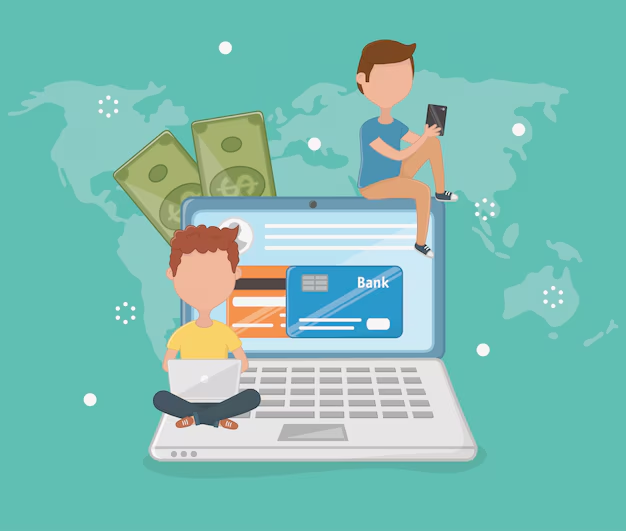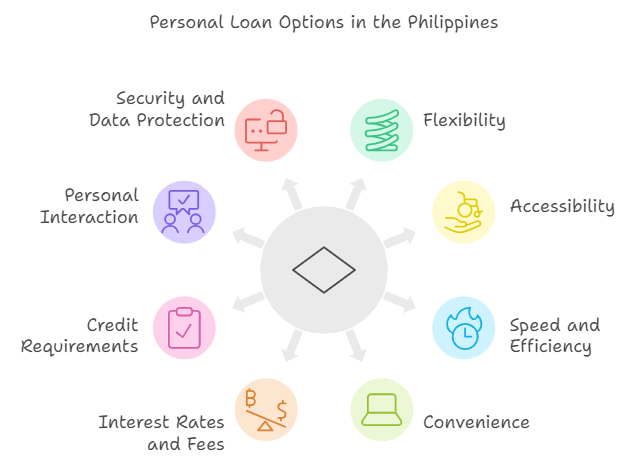Finding yourself needing immediate financial assistance can be daunting, especially when traditional loan processes prove cumbersome and time-consuming. This challenge is particularly relevant in the Philippines, where unexpected expenses or emergencies frequently necessitate quick and reliable financial solutions.
However, online personal loans have revolutionized how Filipinos manage these financial challenges, offering a more convenient and rapid alternative to traditional lending methods.
This blog aims to help you understand online personal loans, how they operate, and the critical differences between them and traditional loans. Moreover, We will also discuss the steps to apply for an online personal loan, the pros and cons, and how to verify legit lenders to have a secure borrowing experience. So, without further ado, let us dive into all the details.

What Are Online Personal Loans, And What Are Their Key Characteristics?

Online personal loans are loans that individuals can apply for and manage entirely through digital platforms without visiting a physical bank or lending institution.
These loans are typically unsecured, meaning they do not require collateral, and are used for various personal expenses, such as debt consolidation, home improvements, or emergencies.
Here, take a look at the key characteristics of online personal loans in the Philippines -
1. Convenience and Accessibility
Online personal loans offer a fully digital application process, allowing borrowers to apply from anywhere with an internet connection. This eliminates the need for in-person visits to banks or lending institutions.
2. Quick Approval and Disbursement
Many online lenders provide instant approval or pre-approval, with funds disbursed within a few hours or days. This is particularly useful for those who need quick access to cash.
3. Unsecured Loan
Most online personal loans are unsecured, meaning they do not require any collateral such as property or assets. Borrowers qualify based on their creditworthiness, income, and other factors.
4. Flexible Loan Amounts and Terms
Online personal loans typically offer flexible loan amounts and repayment terms, allowing borrowers to select options that fit their financial needs and repayment capacity.
5. Higher Interest Rates for Riskier Borrowers
Interest rates for online personal loans can vary, with lower rates for creditworthy borrowers and higher rates for those with poor credit. Since these loans are often unsecured, lenders compensate for the higher risk with higher interest rates.
6. Eligibility and Documentation
The eligibility criteria are typically based on the applicant's credit score, income, and repayment ability. Required documentation, such as proof of income, ID, and bank statements, can be uploaded online.
7. Loan Management
Borrowers can manage their loans through online portals or mobile apps, allowing them to easily track payments, view loan balances, and make repayments. This enhances convenience and transparency for the borrower.
Although online personal loans claim to be unsecured loans, they aren’t always. Check out this Reddit post, where a Reddit user raised concerns about the adequacy of approved loan amounts compared to their needs despite having a solid credit history.
Also Read: Successful Managed Funds and Investments in the Philippines
Key Differences Between Traditional and Online Personal Loans in The Philippines
Navigating the world of personal loans can be daunting, especially when you’re faced with choosing between traditional and online options. Below are some essential differences that may help you decide which type of loan fits you best.

1. Flexibility
Online personal loans are flexible and can be used for various financial needs, unlike traditional loans, which have restrictive purposes.
2. Accessibility
Traditional banks often have strict eligibility criteria, favoring individuals with good credit scores and stable income histories. This can be a hurdle for many.
On the other hand, online lenders often offer more flexible criteria, making it easier for individuals with lower credit scores or less conventional financial situations to access credit.
3. Speed and Efficiency
While traditional loans involve lengthy processing and in-person visits, online loans streamline the entire process, often providing same-day or next-day funding.
4. Convenience
Traditional loans require bank visits and lengthy processes, while online loans allow you to complete everything online at your convenience.
5. Interest Rates and Fees
Interest rates and fees are another area where traditional and online loans differ. Conventional loans often carry higher interest rates and additional fees, partly due to the higher operational costs of maintaining physical branches.
With their reduced overhead, online lenders can often offer more competitive rates and fewer fees.
6. Credit Requirements
Traditional banks tend to have stricter credit requirements, which can be limiting for those with less-than-perfect credit histories.
Online lenders usually have more flexible credit requirements, which opens up borrowing opportunities for a wider audience and provides options for those looking to rebuild or improve their credit scores.
7. Personal Interaction
In traditional banking, face-to-face interactions with loan officers can offer personalized service and guidance that online platforms may lack. This personal touch can benefit those who prefer direct human interaction and want detailed explanations about loan products and terms.
Conversely, online lenders typically operate without much personal interaction, relying instead on automated systems and digital communication channels.
8. Security and Data Protection
Security is a critical concern, especially when dealing with financial information. Traditional loans involve physical documents typically handled by bank staff, lowering the risk of data breaches.
Online loans, however, rely on digital data storage and transmission, which can be more susceptible to cyber-attacks. That said, reputable online lenders implement robust security measures to protect your data.
9. Loan Amounts and Terms
When it comes to loan amounts and terms, traditional loans often win. They generally offer more significant loan amounts and longer repayment terms, which are suitable for substantial purchases or long-term financial commitments.
Conversely, online loans typically offer smaller amounts and shorter terms, making them ideal for immediate financial needs or short-term expenses.
10. Collateral Requirements
Traditional loans, especially for more significant amounts, often require collateral or guarantors, which can be a significant hurdle for some borrowers.
In contrast, most online loans are unsecured, meaning they do not require collateral, which makes them more accessible.
11. Repayment Options
Traditional loans usually offer limited repayment methods, focusing on bank branches or specific payment channels.
Online loans, however, provide more flexible options, including online payments, mobile wallets, and partner remittance centers, ensuring that you can repay your loan in a manner that's convenient for you.
12. Credit Reporting
Lastly, how loans affect your credit score can also differ. Traditional banks typically report loan details to credit bureaus, influencing your credit score. Some online lenders may not report to credit bureaus, affecting your credit profile differently.
Also Read: Top Venture Capital Firms in The Philippines in 2024
How To Apply For an Online Personal Loan in Philippines - Important Steps For Filipino Entrepreneurs To Follow

Applying for an online personal loan in the Philippines is a convenient and efficient way to secure funds for personal or business purposes. It is a straightforward process that requires careful planning and attention to detail.
By researching lenders, preparing documents, and understanding loan terms, Filipino entrepreneurs can secure the necessary funding to meet their business or personal financial needs efficiently and responsibly.
Here are the key steps Filipino entrepreneurs should follow to apply for an online personal loan -
1. Research and Compare Lenders
Research online lending platforms, banks, or financial institutions offering personal loans. Compare their interest rates, loan terms, fees, and customer reviews to find the most suitable lender for your needs.
2. Check Eligibility Requirements
Before applying, review each lender's eligibility criteria. Most lenders require borrowers to be Filipino citizens, between 21 and 65 years old, and have a stable source of income. Ensure you meet the required income levels, credit score, and other qualifications.
3. Prepare Required Documents
Gather the necessary documents for your application. Typically, lenders require the following documents -
- Government-issued ID (e.g., passport, driver's license)
- Proof of income (e.g., payslips, tax returns, bank statements)
- Proof of address (e.g., utility bills)
- Business-related documents (e.g., DTI/SEC registration) may also be required for entrepreneurs.
4. Fill Out the Online Application Form
Once you’ve selected a lender, complete the online application form and visit their website or app. Provide accurate personal and financial information, including your income, employment details, and desired loan amount.
5. Submit Required Documents Online
Upload the required documents directly through the lender’s online portal. Ensure all information is accurate and up-to-date to avoid delays in processing your loan application.
6. Wait for Loan Approval
After submitting your application, most lenders will review your documents and assess your creditworthiness. Depending on the lender, this process can take a few hours or days. Some online lenders provide instant pre-approval.
7. Review the Loan Terms and Conditions
Once approved, review the loan offer carefully. Pay attention to the interest rate, repayment terms, fees, and any penalties for late payments. If everything is acceptable, you can proceed to accept the loan offer.
8. Receive Loan Disbursement
After you accept the loan offer, the funds will be disbursed directly to your bank account. Depending on the lender and your bank, this process typically takes a few hours to a few days.
9. Manage Loan Repayments
Follow the lender's repayment schedule. You can manage your loan repayments through the lender’s online platform, ensuring timely payments to avoid late fees or penalties.
Also Read: Getting a Loan Using Land as Collateral in the Philippines
Say goodbye to financial roadblocks. Apply for N90’s fast financing solutions today and give your Philippine SME the boost it deserves! Get potential loan approvals within 24 hours to finance your business and take it to the next level! Avail Now!
Pros and Cons of Online Personal Loans in The Philippines - Key Points For Philippines To Consider
When considering taking out an online personal loan in the Philippines, it's crucial to consider both the benefits and downsides to make an informed choice.
Here, take a look at them in greater detail -
Advantages of Online Personal Loans
1. Easy Application
One of the biggest perks of online personal loans is the straightforward application process. You can apply right from your home without needing to visit a bank.
2. Fast Disbursal
In emergencies, time is critical. Online personal loans are usually disbursed quickly, often within hours or days of approval, unlike traditional loans, which can take weeks.
3. Lower Interest Rates
Some online lenders offer competitive interest rates that can beat those provided by traditional banks. They often have lower overhead costs, allowing them to pass on the savings to borrowers.
4. Transparency
Online lenders usually offer clear and transparent terms and conditions, helping borrowers understand their loan obligations.
5. Easy to Compare Rates
You can easily compare rates and terms from various lenders without affecting your credit score, ensuring you get the best deal for your situation.
Disadvantages of Online Personal Loans
1. Higher Interest Rates
While some online lenders offer competitive rates, others may have higher interest rates than traditional banks. It's essential to shop around.
2. Hidden Fees
Be cautious of additional fees such as origination, late payment, and pre-termination fees.
3. Credit Score Impact
Missed payments can harm your credit score, complicating future loan applications.
4. Security and Data Protection
Choose lenders with solid security measures to protect your personal and financial information from breaches.
5. Shorter Loan Terms
Many online loans have shorter repayment terms, often up to 30 days, which can lead to higher finance charges and interest rates if repaid slowly.
Also Read: Businesses That Fall Under MSME Sector
How To Verify Legit Online Lenders in The Philippines - Key Points For Philippine Businesses To Consider
Applying for a personal loan online is convenient for unexpected expenses. But with convenience comes risk, particularly the potential of encountering fraudulent lenders.
Here are key points to consider to ensure the online lender you're dealing with is legitimate and secure -
1. Check for Registration with Relevant Government Agencies
Verify if the lender is registered with the Securities and Exchange Commission (SEC) in the Philippines by visiting their website.
2. Look for Customer Reviews and Ratings
One of the most reliable ways to gauge a lender’s reliability is through customer reviews and ratings. These can often be found on financial forums, social media, or specific review websites.
Look for any recurrent complaints about hidden fees, poor customer service, or issues with loan approvals. While a single bad review may not be a dealbreaker, a pattern of negative feedback is a significant red flag.
3. Verify Online Security
Online security is non-negotiable. Ensure the lender’s website is secure by looking for the “lock” icon in your browser's address bar. The site should also use 'https' in its URL, indicating that it's secure.
Avoid websites that don't meet these essential security criteria, as they might not adequately protect your personal and financial information.
4. Evaluate the Lender’s Reputation and History
Research the lender’s background, including its founding date and affiliations with other businesses. Look for credible articles, blogs, or official posts that mention the lender.
If the lender has a history of illegal activities or red flags, it will likely be mentioned somewhere online. A lender’s longevity and established partnerships often speak volumes about its credibility.
5. Check for Physical Premises
Though convenience is a big perk of online loans, legitimate lenders generally have a physical office. The ability to visit an office to discuss your loan, ask questions, or handle disputes adds an extra layer of security and trust.
6. Evaluate the Lender’s Online Presence
A professional, well-maintained website with clear language and good production values indicates a legitimate lender. Pay attention to peculiar details, such as a poorly designed website with broken links, vague content, or odd language, which can be a warning sign.
7. Test Customer Service
Contact the lender’s customer service via email, live chat, or phone. Their responsiveness and the quality of their answers can give you a sense of their legitimacy. Reliable lenders generally offer excellent customer service as part of their service commitment.
8. Ask for Recommendations
Word-of-mouth recommendations from friends and family can be invaluable. Ask them about their experiences with loan providers and whether they encountered any issues or would recommend a particular lender.
9. Be Cautious of Scams
Be wary of lenders that ask for upfront fees, make unrealistic offers, or employ high-pressure tactics to make you sign quickly. If something sounds too good to be true, it probably is. Report any suspected scams to the relevant authorities to help protect others.
10. Check the List of Recorded Online Lending Platforms
The SEC provides a list of recorded online lending platforms. Refer to this list to ensure the lender you are considering is legitimate. This additional step can give you peace of mind and help you avoid fraudulent schemes.
Also Read: Types of Collateral for Secured Business Loans
Popular Legit Online Personal Loans in the Philippines

With so many options available, selecting the best online personal loans in the Philippines can feel overwhelming. However, understanding the specifics of what each financial institution offers can make a significant difference in making the right choice.
Here’s a detailed look at some of the most popular and legitimate online personal loan providers in the Philippines -
1. UNO Digital Bank Personal Loan
The UNO Digital Bank Personal Loan is a substantial option for many Filipinos, offering loan amounts ranging from PHP 10k to PHP 500k. One of the key benefits here is the competitive interest rate, which can be as low as a 1.79% monthly add-on rate.
This corresponds to an annual percentage rate (APR) of around 35.78% to 37.54%, depending on the loan term, which ranges from 6 to 36 months.
2. Radiowealth Finance Cash Loan
Radiowealth Finance offers a more accessible option for those needing a smaller loan. The amounts range from PHP 10k to PHP 5 million. The interest rates are slightly higher, ranging from 2.5% to 3.5% monthly add-on, and the loan terms are shorter, from 3 to 36 months.
3. Tala Loan
For those needing even smaller amounts and shorter terms, Tala Loan offers loans from PHP 1k to PHP 25k for a term of 1 to 61 days. The interest rates for Tala range from 11.4% to 15.6% APR.
4. SB Finance Online Loans
SB Finance offers a comprehensive range of loan products, including Personal Loans, Salary Loans, and Business Loans. Personal Loans range from PHP 10k to PHP 1 million, with terms ranging from 6 to 48 months for personal loans.
5. CIMB Personal Loan
CIMB Bank offers personal loans ranging from PHP 30k to PHP 1 million with interest rates between 1.2% and 2.5% monthly. The loan term can vary from 12 to 60 months, allowing borrowers to choose a repayment schedule that fits their budget.
Conclusion
As this in-depth article has shown, online personal loans offer a quick and convenient lifeline. Their immediacy makes them ideal for unexpected expenses, such as medical bills, emergency repairs, or natural disasters.
Accessing funds 24/7 from the comfort of your home has never been easier, and it can significantly ease financial burdens, especially during crises. However, the ease of acquiring online loans comes with the responsibility to repay them promptly. Timely repayment is not just about clearing your debt but also about building a positive credit history.
It is also worth noting that possessing a good credit score opens the door to better loan options in the future, often with more favorable interest rates and terms. Conversely, missed payments can lead to additional fees and negatively impact your credit score, making future borrowing experiences more difficult and expensive.
Finally, while online loans can be a valuable tool in times of crisis, it’s equally essential to consider alternative strategies, such as building an emergency fund. Preparing in advance can often mitigate the need for loans, offering a more sustainable way to handle financial uncertainties.
Frequently Asked Questions (FAQs)
1. What are the legitimate online loans that guarantee approval in the Philippines?
Legit online loans with guaranteed approval in the Philippines typically have fast processing and are offered by licensed financial institutions. However, ‘guaranteed approval’ may depend on meeting basic requirements.
Here are some reputable options -
- Tala Philippines
- Cashalo
- GCash GLoan
- Moola Lending
- UnaCash
2. How do you check legit lending companies in the Philippines?
To check if a lending company is legitimate in the Philippines, start by verifying if it is registered with the Securities and Exchange Commission (SEC). You can visit the SEC website and search for the company's name in their "Registered Financing and Lending Companies" database.
Additionally, check if the company is listed on the Bangko Sentral ng Pilipinas (BSP) website if they provide financial services regulated by the BSP. Legitimate companies should have a physical office address and transparent loan terms.
Avoid lenders that make unrealistic guarantees or have unclear contact details. Always review customer feedback and online reviews for added assurance.
3. How do you get a personal loan in the Philippines?
To get a personal loan in the Philippines, start by researching banks or online lenders and comparing their interest rates and terms to find the one that best suits your business’s needs.
Next, prepare the required documents, such as a valid ID, proof of income, and employment details, and submit your application, either online or in person. Once approved, the loan amount is disbursed to your account, and repayment terms begin.
4. Are online loans legal in the Philippines?
Yes, online loans are legal in the Philippines as long as the lending company is registered and regulated by the Securities and Exchange Commission (SEC). Legitimate online lenders must comply with Philippine laws, including providing transparent loan terms and fair interest rates.
Borrowers should ensure the lender is SEC-registered and avoid unregulated or predatory lending platforms to provide legal protection.













